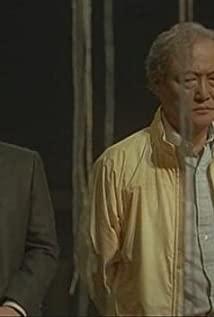The "squatting at home" referred to in the film is subtly different from the otaku "otaku" we often say. Otaku usually have extraordinary obsessions with something: games, anime, AKB48... and the life of "squatting at home" is almost aimless, just like the otaku played by Teruyuki Kagawa at the beginning of the film, who uses a paper roll core Pressing a circle of indentation on the palm of his hand, thinking "How long will it take to disappear? 10 seconds? 10 months? 10 years?" To fall asleep sitting on the toilet.
Immediately afterwards, the camera turns to the otaku's recurring, regular, but equally aimless life. He neatly stacked household waste such as roll paper cores and pizza boxes to make a work of art. Maybe it's because he's too bored with nothing to do, maybe it's just because he doesn't want to go out and take out the trash. He reads, and the content of the book can still arouse his reverie about the outside world, but his actions are no action, and continue to reverie. Otaku's lack of mobility is highlighted here. Of course, this characteristic is also reflected in his wandering at the door of his father's room but not taking a step for ten years. Repeating this over and over again can be seen from his ten-year-old pizza ordering process: opening the door, handing over the money, getting the pizza, closing the door... There are too many cycles, maybe he himself has been trapped in this circle and cannot break through. And the most striking one is the otaku leaning on a stack of pizza boxes, silently watching the passage of time minute by minute: on the hands of the clock, on the angle of the sun shining on the tatami, on the cheese shreds stretching In terms of the length... This paragraph most concentratedly reflects the characteristics of the life of "squatting at home": they have nothing special to pursue, nor anything they dislike; they don't particularly like or dislike; they have no special joy, neither No particular sadness. They do not have intense feelings and wonderful lives, some just let themselves indulge in lifeless and peaceful daily life, and slowly die.
Then came the opportunity to break the routine: the otaku who hadn't spoken a word to anyone for ten years, and had never even met his eyes, suddenly turned to look at the girl's face when he saw the garter of the courier girl. There was an earthquake suddenly - it can be regarded as an iconic element of Japan, but it can also allude to the inner vibration of the protagonist, and then the girl fainted, and the otaku was at a loss, and suddenly found the Chaos button on the girl. "Is it a robot?!" Everything shouted on the otaku's face - and then he pressed it.
The girl wakes up immediately, and here the plot begins to unfold: As soon as the girl wakes up, she precisely locates a pizza box that was put upside down, and it is actually a robot! We didn't have time to accept all kinds of god settings, but found that the girl was going to go to the house, and the two would never see each other again. At this time, the otaku resolutely rushed out of the door he hadn't stepped out for ten years, walked to a street that should be familiar but very unfamiliar, ran, broke the aimless daily life of ten years, and for the first time had something to pursue.
What the otaku saw and heard while running was a seemingly absurd but down-to-earth thought carefully arranged by the director. There was no one on the street, and the otaku occupied the residential area: some were newbies, and some had been housed for ten years. several years. The humanoid robot delivering pizza on the street smiled when he saw the back of the otaku running away... In reality, otakus are indeed an increasingly large group, and will the ever-emerging high-end machinery make us the basics of being human? Capability is gradually lost? Or have we been drawn into an era where we have no time to ponder, and can only follow the gears of fate to slowly reach the stage that has been predicted? Perhaps the director put his hope on the protagonist, because in the last earthquake-perhaps it hinted that the otaku's heart is galloping, or it may imply that the end of the whole otaku world is coming. In the end he struggled to drag the girl out of the house.
He pressed the Love button hard.
"Earthquake." The film came to an abrupt end.
The director did not bother to make a catastrophic prediction, but left the ending to the audience, which is thought-provoking. It also makes us believe that no matter how mechanized the world is, no matter how dull our lives are, no matter how difficult it is to break the peaceful daily life on the surface, no matter how homeless you are, you can always find a trace of pursuit, a little hope, to bring you from the world of nothingness. rescued.
View more about Tokyo! reviews











